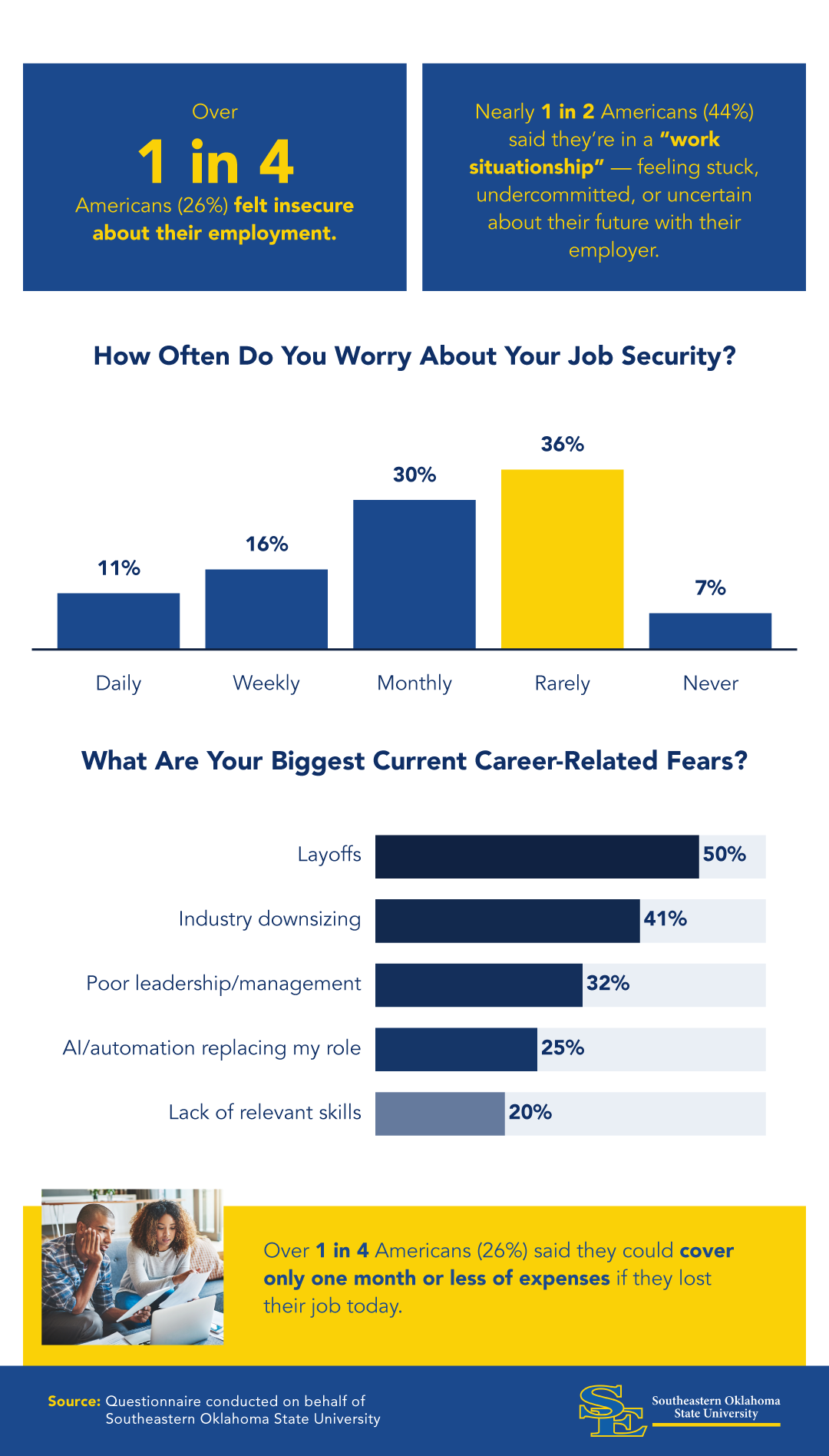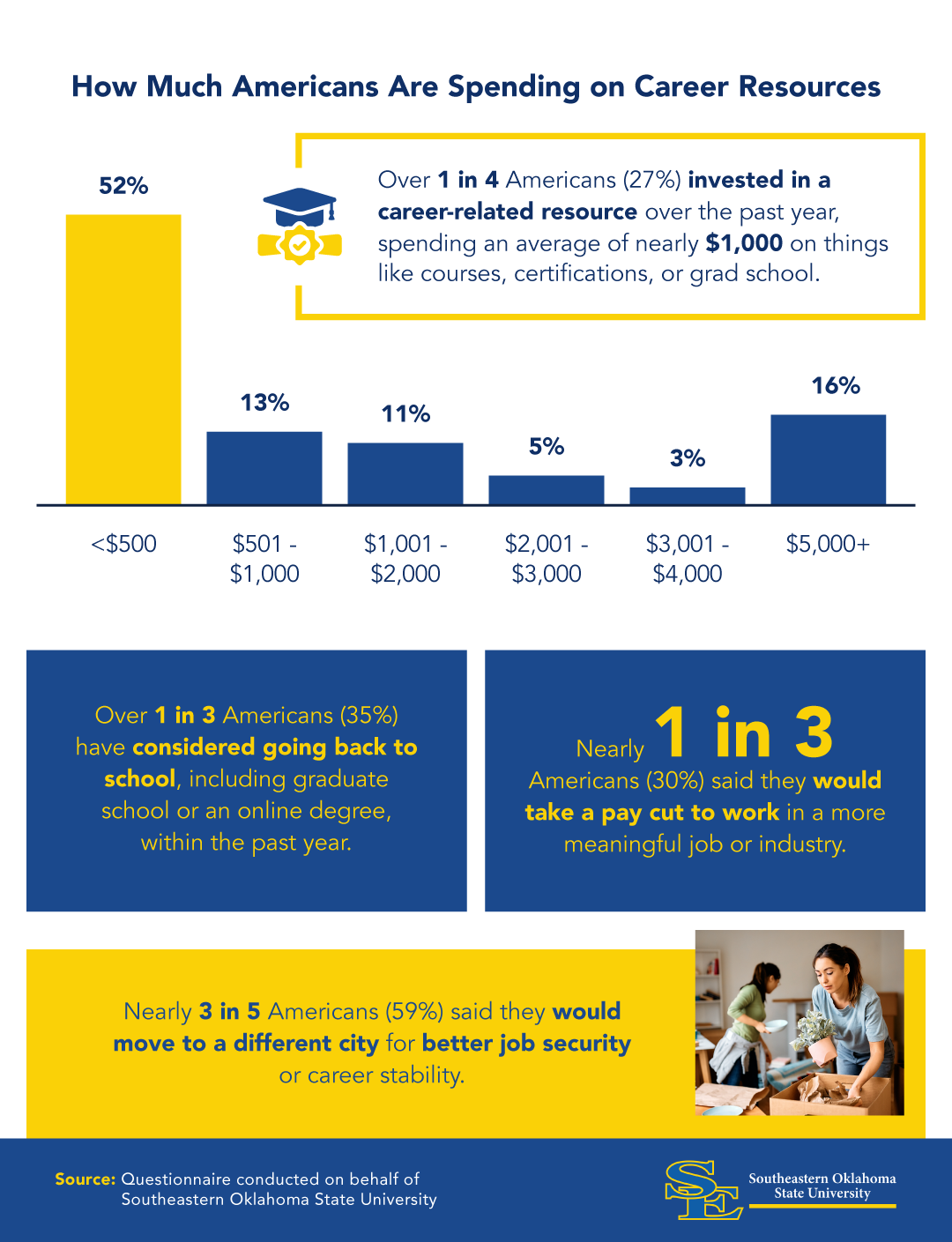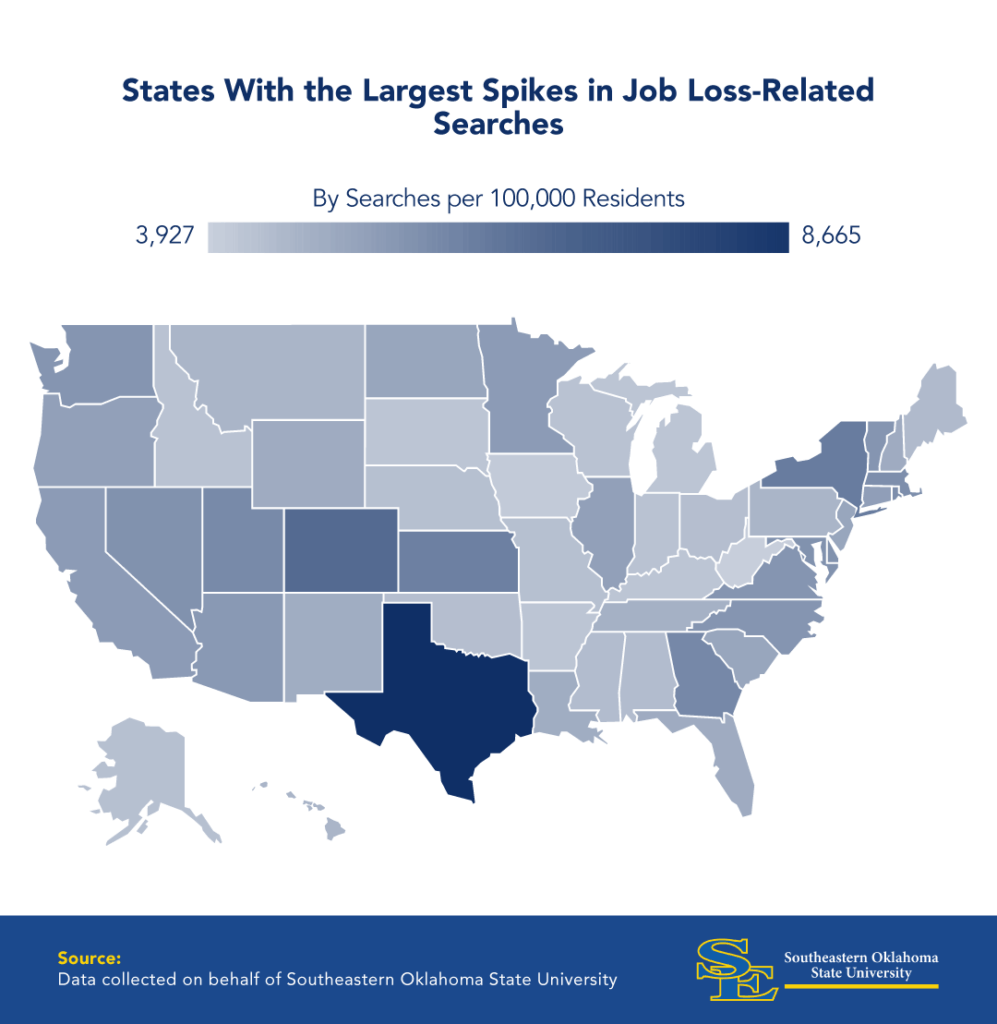
As layoffs, automation and economic instability dominate the headlines, many Americans are feeling uneasy about their careers. A new national questionnaire of 1,000 full-time workers explores where job insecurity is highest, who is most likely to consider a career pivot and how people are preparing for the unexpected. The results reveal how education, age and geography shape career confidence, as well as what steps workers are taking to future-proof their careers.
Key Takeaways
- Over 1 in 4 Americans (26%) feel insecure about their employment.
- Over 1 in 3 Americans (35%) have considered going back to school, including pursuing a graduate degree or an online degree, within the past year.
- Nearly 3 in 5 Americans (59%) would relocate to a different city for better job security or career stability.
- Generation Z is the most likely to consider additional education, with 1 in 2 (49%) exploring graduate or online degrees. Millennials follow at 36%, Generation X at 26% and baby boomers at 22%.
- Roughly 1 in 7 Americans (15%) are not at all confident in their ability to find a new job or pivot to a new industry if needed.
- Job loss anxiety is surging the most in Texas, Colorado and New York, while West Virginia, Iowa and South Dakota show the lowest concern.
Who Feels Most Insecure at Work?
Economic uncertainty is affecting Americans across generations, but some feel the pressure more than others.

More than 1 in 4 Americans (26%) reported feeling insecure about their employment. Nearly half (44%) also described being in a “work situationship,” meaning they feel stuck, undercommitted or uncertain about their future with their employer. Younger workers were more likely to think this way. Just 22% of baby boomers felt like they were in a work situationship, compared to 46% of millennials, 43% of Gen X and 42% of Gen Z.
How Work Affects Different Aspects of Well-Being
| Category | Negatively | No Impact | Positively |
| Burnout | 61% | 34% | 5% |
| Mental health | 55% | 33% | 13% |
| Physical health | 35% | 54% | 11% |
| Sleep quality | 48% | 45% | 8% |
| Stress | 67% | 25% | 8% |
Feelings of job insecurity were most common among Gen Z (28%), followed by millennials and Gen X (both at 26%). Only 19% of baby boomers said the same. Around 1 in 10 Gen X (12%), millennials (11%), and Gen Z (10%) reported worrying about their job security every day. Workers in the following industries had the highest levels of job insecurity:
- Science/Research
- Retail
- Entertainment
- Manufacturing
- Tech
Top fears included layoffs (50%), industry downsizing (41%) and poor management (32%). A quarter feared being replaced by AI, while 20% worried about lacking relevant career skills. Another 17% believed AI could replace their job within the next year.
When asked about financial readiness, over 1 in 4 Americans (26%) said they could only cover one month or less of expenses if they lost their job. On average, Americans could afford just over four months of living expenses without any work income.
How Americans Are Preparing for Career Change
Workers are not just worrying about their careers and doing nothing about it. They’re taking action to feel more secure and fulfilled.

In the past year, 35% of Americans have considered returning to school, including online and graduate programs. Gen Z led the way at 49%, while fewer millennials (36%), Gen X (26%) and baby boomers (22%) said the same.
Some people actually took the plunge, with 27% saying they had invested in a career-related resource, such as a course or certification, in the past year. Overall, they spent an average of nearly $1,000. Gen Z spent the most ($1,160), followed by Gen X ($1,020), millennials ($910) and baby boomers ($530).
More than 2 in 5 Americans (42%) said their region lacks stable job opportunities. Job instability concerns were highest in the West (47%) and South (44%), while the Midwest and Northeast tied at 38%. Nearly 3 in 5 Americans (59%) said they would relocate for better job security or career stability. Gen Z was the most willing to move (77%), followed by millennials (63%), Gen X (48%) and only 15% of baby boomers.
Over half of Americans (53%) currently have a side hustle or freelance as an income backup plan, while another 9% said they plan to start one soon. Americans were also delaying personal milestones due to career concerns, including:
- Traveling or sabbaticals (28%)
- Buying a home (25%)
- Relocating (20%)
- Having children (13%)
- Retiring (12%)
- Starting a business (10%)
- Getting married (8%)
In terms of job mobility, 49% felt confident that they could switch jobs or industries if needed. Just 15% were not at all confident in their ability to do so. The biggest barriers to changing jobs or industries included fear of instability (40%), financial obligations (33%), lack of interest (32%), lack of skills/credentials (24%), family/location constraints (23%) and lack of time (15%).
Meanwhile, 30% of Americans said they would take a pay cut to work in a more meaningful job or industry. Gen Z was the most open to this trade-off (32%), followed closely by millennials and Gen X (30% each). Only 19% of baby boomers felt the same.
Where Is Job Anxiety Growing the Fastest?
Search behavior reveals where workers are most concerned about job security.

According to Google search data from April 2024 to June 2025, the states with the highest per capita increases in job loss-related searches are:
- Texas
- Colorado
- New York
- Kansas
- Georgia
- Utah
- Rhode Island
- Massachusetts
- Delaware
- Nevada
States with the lowest search spikes per 100,000 residents:
- West Virginia
- Iowa
- Arkansas
- South Dakota
- Michigan
- Kentucky
- Wisconsin
- Indiana
- Idaho
- Missouri
Among the 50 most populous U.S. cities, the highest job loss concern per capita appears in:
- Atlanta, Georgia
- Minneapolis, Minnesota
- Houston, Texas
- Miami, Florida
- Baltimore, Maryland
- Denver, Colorado
- Seattle, Washington
- Boston, Massachusetts
- Tampa, Florida
- Las Vegas, Nevada
Cities with the least concern per 100,000 residents:
- Mesa, Arizona
- Wichita, Kansas
- Tulsa, Oklahoma
- Bakersfield, California
- Fresno, California
- Phoenix, Arizona
- Oakland, California
- Oklahoma City, Oklahoma
- Los Angeles, California
- Louisville, Kentucky
The most searched job loss-related terms across the country include:
- “Unemployment benefits”
- “Job loss”
- “Insurance for job loss”
- “Severance package”
- “Recession-proof jobs”
- “Artificial intelligence job loss”
- “Signs of layoffs”
- “What to do after being laid off”
- “Job loss depression”
- “Job loss lawyer”
Staying Ahead in an Uncertain Job Market
Job insecurity is rising across the U.S., especially among younger generations and in economically sensitive regions. But many Americans are taking proactive steps, from reskilling to relocation, to protect their careers. While economic pressures continue to shape professional lives, the data shows that a growing number of people are willing to invest in themselves to adapt and stay confident.
Methodology
Risepoint conducted a questionnaire of 1,000 American full-time workers to uncover how rising economic uncertainty is shaping their sense of job security. The average age of respondents was 39; 45% were women, 54% were men and 1% were non-binary. Generationally, 3% were baby boomers, 30% were Gen X, 53% were millennials and 15% were Gen Z. Due to rounding, some percentages in this study may not total 100% exactly.
Additionally, Risepoint analyzed Google Trends search volume data from April 2024 to June 2025 to determine the U.S. cities and states are experiencing the highest anxiety about job loss. The analysis examined search trends for 358 search terms across all 50 states and in the 50 most populous cities. To ensure reliability, only keywords with a consistent upward trend over the period were considered. Risepoint ranked the top trending searches in each state and city using a per capita calculation to highlight significant deviations in search volume.
About Southeastern Oklahoma State University
Southeastern Oklahoma State University offers flexible, affordable online graduate, undergraduate and certificate programs that help working adults adapt to today’s rapidly evolving workforce. Whether you’re looking to advance in your current role or prepare for a new industry, Southeastern provides education designed to support real-world career goals.
Fair Use Statement
This content is for noncommercial use only. If you share or reference this study, please link back to Southeastern Oklahoma State University and provide proper credit.